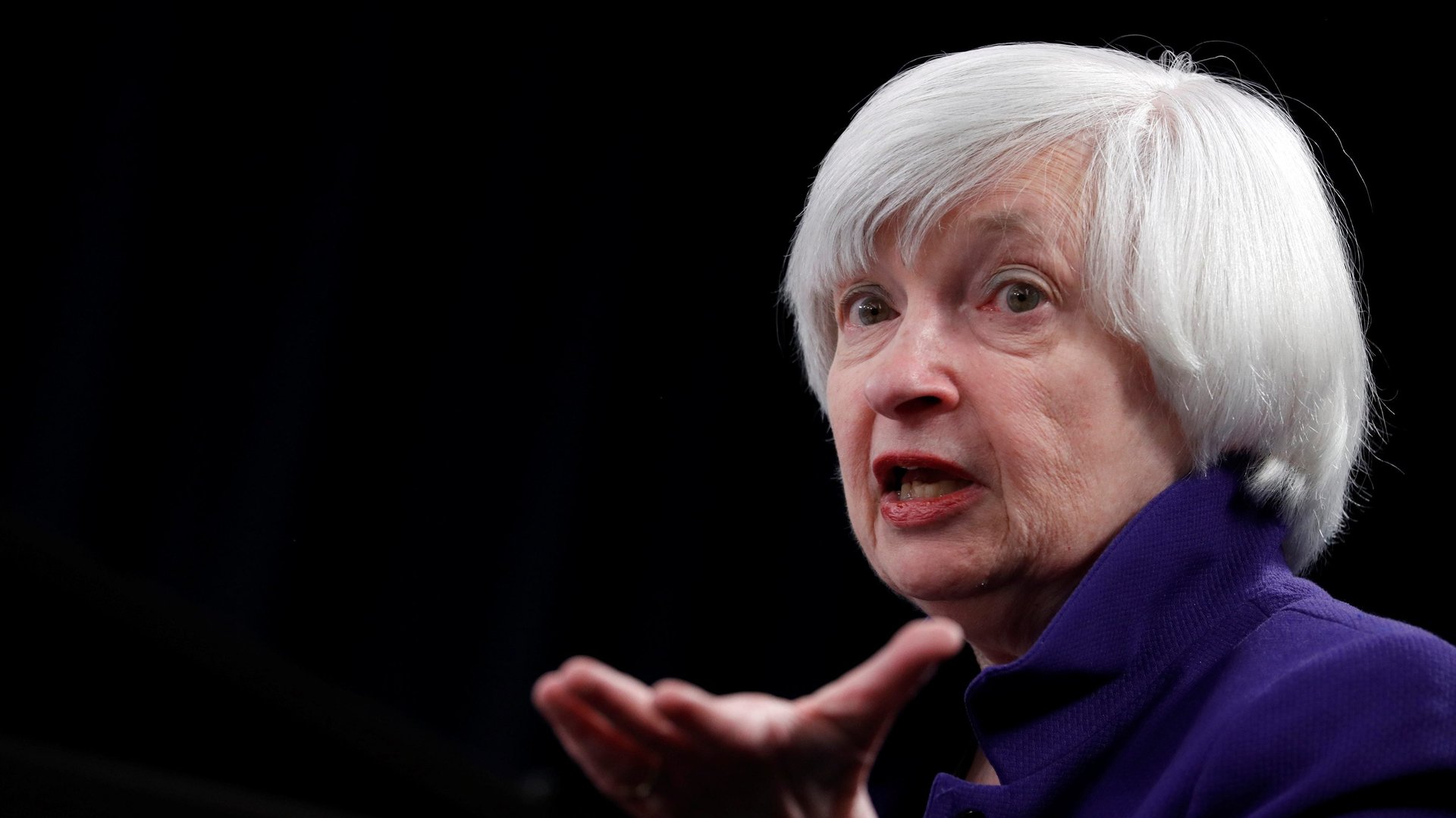Janet Yellen’s evolution on equality makes her a perfect pick for US Treasury secretary
Politically, Janet Yellen was the safe choice among the names on president-elect Joe Biden’s shortlist for his Treasury secretary. She’s well-respected by investors and people on both sides of the ideological spectrum.


Politically, Janet Yellen was the safe choice among the names on president-elect Joe Biden’s shortlist for his Treasury secretary. She’s well-respected by investors and people on both sides of the ideological spectrum.
But the former Federal Reserve chief’s focus on diversity also makes her an ideal pick for an administration interested in making inclusivity central to US governance. If she’s confirmed by the Senate, she would be the first woman to fill the role.
“Underrepresentation of women likely constrains the range of issues addressed and limits our ability to understand familiar issues from new and innovative perspectives,” Yellen said in a keynote speech at a Washington DC think tank last year. She closed the talk with a call to make diversity in economics and the federal government “a top priority.”
Yellen’s professional qualifications include 15 years of central bank experience, her current role as president of the American Economic Association (AEA), and a high level of trust from both Democrats and Republicans.
The US Treasury secretary (comparable to a finance minister in other countries) is the primary economic advisor to the president, and is responsible for managing the federal government’s finances. Yellen’s advice on finance, monetary, economic, trade, and tax policy would give her an opportunity to promote policies—for example, amendments to lending and housing finance rules—that better recognize the challenges experienced by women, Black Americans, and other vulnerable US groups.
“Yellen understands the impacts of diverse perspectives on economic policymaking,” says Anna Gifty Opoku-Agyeman, co-founder of economics nonprofit The Sadie Collective. Opoku-Agyeman points to—as Yellen has—how more diversity among decision makers during the 2008 financial crisis could have helped many Black and Latino Americans avoid devastating economic outcomes.
Yellen wasn’t the first Fed representative to emphasize diversity and inclusion: During a 2013 conference organized by the Levy Economics Institute of Bard College, former Fed board governor and deputy Treasury secretary Sarah Bloom Raskin focused entirely on the topic. “Traditionally, the distribution of wealth and income has not been a primary consideration in the way most macroeconomists think about business cycles,” she said. “But if inequality played a role in the financial crisis, if it contributed to the severity of the recession, and if its effects create a lingering economic headwind today, then perhaps our thinking, and our macroeconomic models, should be adjusted.”
During her own Fed tenure, the more equal distribution of wealth became a consistent talking point for Yellen. In a 2016 hearing before the House Financial Services Committee, she described the widening wealth gap between races as “extremely disturbing,” and cited research showing that greater inequality could have an impact on consumer spending and education opportunities. During a session at this year’s AEA conference titled “How Can Economics Solve Its Race Problem?” (the conference solved gender last year), Yellen said racial disparities are “deeply unfair,” and quoted an AEA survey response from a Black member who said “economics is dominated by people who have little concern about the consequences of racism.”
She has also become more vocal about diversity over the course of her career. In an interview with the Financial Times, Yellen said that 20 years ago she might have argued that her gender hadn’t done anything to slow her professional progress. In hindsight, she appreciates how difficult it was for women in economics to get credit for their part in naturally collaborative work, and says there are men in the field today who remain “extremely aggressive and hostile towards women.”
Treasury secretary would give Yellen a large platform for pushing progress, the opportunity to name a diverse team of economic advisors, and a chance to weigh in on wider changes to the government’s hiring culture. Opoku-Agyeman says she would be excited to see Black economists such as Lisa D. Cook, an economics professor at Michigan State; William E. Spriggs, chief economist to the AFL-CIO; or Valerie Wilson, director of the Economic Policy Institute’s program on race, ethnicity, and the economy included in discussions on how to alleviate economic and racial pain in the US.
Of course, the next Treasury secretary will also need an excellent working relationship with president-elect Biden. “I don’t think it’s about your willingness to do something; it’s your ability to get the president’s ear” says Joao Gomes, chair of the finance department at the University of Pennsylvania’s Wharton School, who thinks Yellen would be a strong choice. “Markets trust her, businesses trust her; everyone knows what she means…She would be a heavyweight and she would be listened to.”
This item was originally published on Nov. 12 and has been updated to reflect Yellen’s forthcoming nomination.